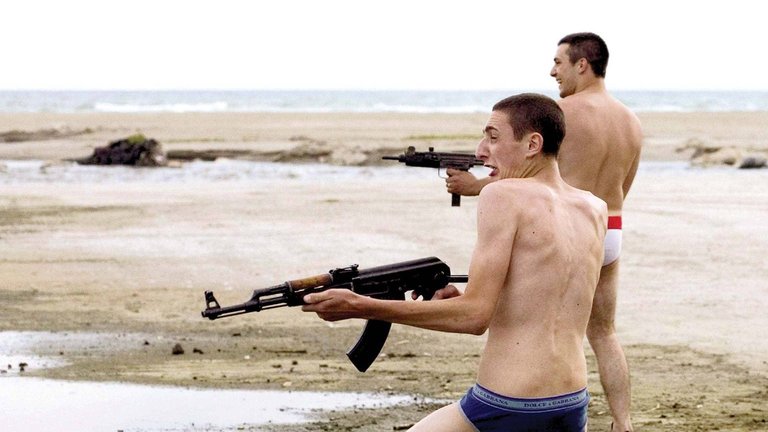Film Review: Gomorrah (2008)

If one had to spend the rest of their life under police protection due to a book they had written, it would either be because the book's subject matter or the author themselves were extraordinary. Such is the case with Roberto Saviano, an Italian investigative journalist whose 2006 best-selling book, Gomorrah, exposed the organised crime scene in his native city of Naples and the neighbouring regions. The book's revelations led to death threats so serious that the Italian government authorised police protection for Saviano. In 2008, the book was adapted into a feature film of the same name, directed by Matteo Garrone. The film is widely regarded as one of the most critically acclaimed works of Italian cinema in the 21st century.
Gomorrah is composed of five fictional and loosely connected stories that revolve around the factional war within one of the clans of Camorra, a traditional criminal organisation that operates in Naples. The conflict is triggered by a group assassination that takes place in a tanning salon at the very beginning of the film. The first story revolves around Don Ciro (played by Gianfelice Imparato), a timid middle-aged Camorra member whose task is to provide financial support to incarcerated Camorra members and who is suddenly forced to take sides in an increasingly brutal and bloody conflict. The second story follows Totò (played by Salvatore Abruzzese), a 13-year-old boy who is recruited into Camorra and participates in the violence. Carmine (played by Carmine Paternoster) is a university graduate whose Camorra-connected boss, Franco (played by Toni Servillo), is involved in the illicit dumping of toxic waste that pollutes fields and orchards that supply Naples with food. Pasquale (played by Salvatore Cantalupo) is a talented tailor who helps Chinese sweatshop workers develop their own fashion business, thus becoming competitors to local Camorra-connected garment producers. Finally, Marco (played by Marco Macor) and Ciro (played by Ciro Petrone) are two teenagers who accidentally get their hands on automatic weapons and, inspired by their favourite film Scarface, use them to go on a crime spree with vague aspirations of becoming big gang bosses in Naples.
Those who have based their perception of Italian organised crime on Hollywood films and TV shows would likely be taken aback by the unromantic view of Camorra presented in Gomorrah. This is partly due to the fact that Italians, like Saviano and Garrone, are exposed to the same phenomenon at its source and know better. It is also partly because Camorra, being a looser organisation than the Sicilian Mafia, lacks the mystique associated with the latter. Furthermore, in the 21st century, all criminal organisations, including those in Italy, have adopted new and increasingly ruthless methods of running their business, abandoning any semblance of "honour" or "rules."
Gomorrah portrays a bleak and unromantic picture of Camorra and its impact on everyday life in Naples and beyond. While most of the participants and victims belong to the lower rungs of society, Camorra affects everyone, including those who are supposed to belong to the middle class, talented artists, farmers whose produce is tainted by Camorra's activities, African immigrants, and Chinese slave labour. Drugs, prostitution, and extortion are just a few of the many activities that blur the lines between crime, business, and politics. Franco, in one of his lines, even suggests that Camorra's shady dealings are to the benefit of the European Union.
The bleak content of Gomorrah is matched by its visual style, which is dominated by desaturated colours and a moving camera that makes the film look like a documentary. Authenticity is further enhanced by the use of the bleakest locations in Naples and local non-professional actors, some of whom would later be arrested and convicted for Camorra-related crimes. The lack of music and the quick, brutal, and shocking violence further add to the hyperrealism of the film.
The use of five unrelated stories is a convenient way to give the film an epic scope that a single story would usually fail to achieve. However, this structure, like with anthology films, also results in some of the segments appearing less well-developed than others. The tragicomic story of Marco and Ciro, with its pop culture references, is likely to be remembered more than the other four.
Gomorrah premiered at the Cannes Film Festival and received widespread critical acclaim, earning a nomination for the Golden Globe for Best Foreign Film and the European Film Award for Best Film. Saviano's book later served as the basis for a television series, which ran for five seasons between 2014 and 2021, albeit with a more coherent plot than the film.
At the end of the day, Gomorrah is a powerful and unflinching portrayal of the dark underbelly of Neapolitan society and the destructive impact of organised crime.
RATING: 7/10 (+++)
Blog in Croatian https://draxblog.com
Blog in English https://draxreview.wordpress.com/
InLeo blog https://inleo.io/@drax.leo
Hiveonboard: https://hiveonboard.com?ref=drax
Rising Star game: https://www.risingstargame.com?referrer=drax
1Inch: https://1inch.exchange/#/r/0x83823d8CCB74F828148258BB4457642124b1328e
BTC donations: 1EWxiMiP6iiG9rger3NuUSd6HByaxQWafG
ETH donations: 0xB305F144323b99e6f8b1d66f5D7DE78B498C32A7
BCH donations: qpvxw0jax79lhmvlgcldkzpqanf03r9cjv8y6gtmk9
Congratulations @drax! You have completed the following achievement on the Hive blockchain And have been rewarded with New badge(s)
You can view your badges on your board and compare yourself to others in the Ranking
If you no longer want to receive notifications, reply to this comment with the word
STOPCheck out our last posts: